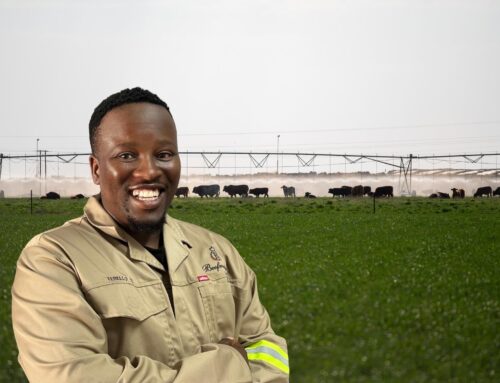South Africa’s beef sector is teetering on the edge as a renewed Foot and Mouth Disease (FMD) outbreak sends shockwaves through the industry. Operations across the beef value chain are being severely disrupted, prompting fears over trade continuity, job losses, and the collapse of local and international market confidence.
Deepening Crisis as Outbreak Spreads
The current outbreak marks another serious setback for an industry already under pressure. Beefmaster Group, a leading beef producer and exporter, warns that the unchecked spread of FMD is exposing critical enforcement failures and placing enormous strain on farmers and processors trying to survive in an already volatile economic environment.
“We understand why some in the industry are taking risks to move cattle despite restrictions,” says Roelie van Reenen, Supply Chain Executive at Beefmaster Group. “If there isn’t a market for your animals and you see an opportunity to sell, you’re going to try. But this is economic suicide for the entire industry.”
Volatile Prices and Market Instability
Van Reenen highlights the extreme volatility in beef and weaner prices, citing erratic consumer demand and supply chain disruptions linked to the FMD outbreak. These fluctuations are unsettling producers, retailers, and consumers alike.
“There are no winners in this situation. Without coordinated action, we risk losing valuable market share both locally and internationally due to declining confidence in South Africa’s red meat industry.”
The ripple effect has already begun. South Africa recently lost access to the Chinese beef export market, a blow that underscores the international implications of local outbreaks.
A Fragile Recovery Undermined by Enforcement Gaps
Although the government has announced plans to tighten biosecurity protocols for livestock with cloven hooves, Van Reenen cautions that legislation alone is insufficient.
“FMD outbreaks continue to emerge, and the threat is ongoing. We need to enforce existing protocols, apply stricter oversight on livestock movement, and work together across the industry to curb the spread.”
A major concern remains the limited availability and accessibility of FMD vaccines, particularly in high-risk regions.
“Without vaccines, we are fighting a wildfire without water. Government must prioritise vaccine supply if we are to protect the national herd and stabilise the agricultural economy.”
While an increase in vaccine distribution has been announced in KwaZulu-Natal, it’s only one piece of the puzzle. Education around biosecurity measures is urgently needed.
Biosecurity Must Be Taken Seriously
“Effective biosecurity starts at the farm gate,” says van Reenen. “Complacency, especially the belief that geography offers protection, is dangerously misplaced. We must all recognise the gravity of the situation.”
Van Reenen stresses that short-term survival tactics must not undermine the long-term future of the industry.
“We know some are already devastated by the current crisis, but unless we act decisively now, the damage to South Africa’s beef industry and broader agricultural sector will be irreversible.”
Frequently Asked Questions (FAQs)
Q: What is Foot and Mouth Disease (FMD)?
A: Foot and Mouth Disease is a highly contagious viral disease that affects cloven-hoofed animals such as cattle, pigs, sheep, and goats. It causes fever, blisters, and lameness, and can lead to severe production losses. Though not typically dangerous to humans, it poses a major threat to the livestock industry due to trade restrictions and economic damage.
Q: How does FMD affect South Africa’s beef industry?
A: FMD outbreaks result in movement bans, loss of export markets, and consumer confidence erosion. The current outbreak has already caused South Africa to lose access to major international markets, such as China, and is disrupting pricing, supply chains, and local economic stability.
Q: What is being done to combat the FMD outbreak?
A: The South African government has announced increased biosecurity measures and a boost in vaccine supplies, particularly in affected provinces like KwaZulu-Natal. Industry leaders like Beefmaster Group are calling for stricter enforcement, clear movement protocols, and national cooperation.
Q: What role does biosecurity play in preventing FMD?
A: Biosecurity refers to the preventative measures taken to reduce the risk of introducing or spreading infectious diseases. This includes farm-level hygiene, quarantine protocols, and controlled livestock movement. Without proper biosecurity, FMD can spread rapidly across regions.
Q: Is there a vaccine for FMD in South Africa?
A: Yes, there are FMD vaccines, but limited availability and distribution challenges persist. Van Reenen stresses that vaccine access must be prioritised to protect livestock and the wider economy.
Q: What can farmers and producers do now?
A: Here are a list of things you can do:
- Follow all movement restriction protocols
- Implement strict biosecurity at the farm level
- Report any signs of FMD immediately
- Participate in industry-wide cooperation efforts
- Advocate for better enforcement and vaccine access
Final Word
The message from industry experts is clear: without immediate, united action, the FMD outbreak threatens to decimate South Africa’s beef industry. Preventing further damage will require not only government intervention but full cooperation across the sector, from farmers to exporters.
“Short-term survival cannot justify long-term destruction,” concludes van Reenen. “If we don’t act now, the cost will be catastrophic.”






